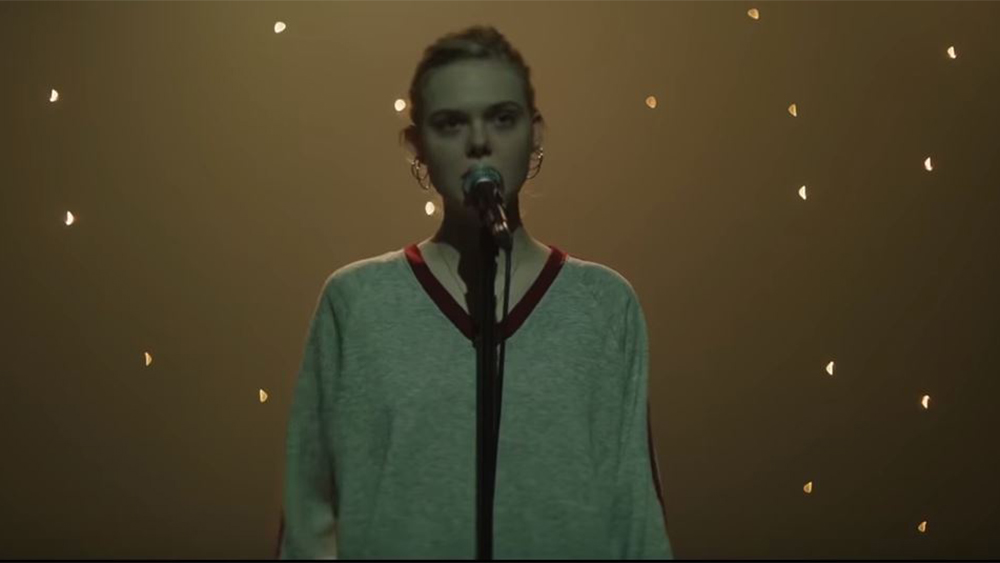Toronto Film Review: Elle Fanning in ‘Teen Spirit’
By Owen Gleiberman
LOS ANGELES (Variety.com) – “Teen Spirit” comes on like a very now movie about pop music and those who inject it like an adrenalized sugar-high dream. (I’m one of them.) Violet (Elle Fanning), a 17-year-old British girl who lives with her Polish immigrant mother (Agnieszka Grochowska) on a farm on the Isle of Wight, is in thrall to the incandescent rush of pop. She plugs into it on her iPod, she sings it with piano accompaniment at a dingy local tavern, and when officials from an “American Idol”-style competition show called “” turn up on the Isle looking for contestants, Violet signs right up. She wants fame, rapture, a chance to be rescued from the flat dull anonymity of her normalcy. The movie is a Cinderella fantasy for the age of aspirational global stardom, and it features a soundtrack of ecstatic up-to-the-minute EDM, though it also finds room for such delectable chestnuts as Ellie Goulding’s “Lights” and even “Flashdance…What a Feeling.”
If “Teen Spirit,” however, wants to be a movie of the moment, the genre of indie fairy tale it belongs to is older to the point of being rather creaky. Scrape away the pop frosting, tasty as it is, and what’s underneath is basically one of those cookie-cutter Miramax “crowd-pleasers” from the ’90s: a movie that’s formulaic in every detail but that passes off its particular cute brand of British Isles whimsy as a vaguely high-toned signifier of “authenticity.” There have been other recent examples of this genre, such as the dreadfully overpraised “Patti Cake$” (where New Jersey, in effect, stood in for a setting like Manchester). “Teen Spirit” is the kind of film that tends to please crowds to an inordinate degree at festivals and then, eight months later, gets released into the real world, where it turns out that no one gives much of a hoot about it. That’s because there was never a lot there to begin with.
I don’t mean to sound unkind. This is the first film written and directed by Max Minghella, the heartthrob actor son of the late director Anthony Minghella, and he does a slick, proficient job of staging a youth-trance fable that doesn’t pretend to be more than it is. You might ask: Why can’t a movie be as confectionary as a pop song? In theory it can, and “Flashdance” is the perfect example. That’s not a movie you watch — it’s a movie you play, like a collection of irresistible singles.
Yet what pop-song storytelling means in “Teen Spirit” is that Violet, as a character, is never filled in. She’s brimming with alienated heartache, but it’s all very vague and free-floating. What it comes down to is that plays the part with a desultory pout that never varies, and the cinematographer, Autumn Durald, bathes the movie in a high-gloss murk that’s supposed to represent kitchen-sink despair.
It also means that the central relationship in the movie — the only one, really — is between Violet and a shaggy old disgruntled drunk grizzly bear named Vlad (played by the 65-year-old Croat-Danish actor Zlatko Burić), who becomes her friend and manager. Vlad, who looks like a towering frizzy-haired Central European version of Brian De Palma, is the kind of character who is terminally wacky precisely because he’s so not wacky. That’s what makes him such a “character.” (He doesn’t even know he’s funny!) We learn that he was once a famous opera singer, and that he has a daughter who’s also a noted musician, but we never learn how he fell from grace. It’s as if the generified screenplay was too hip to be bothered with such stodgy elements as backstory.
News flash: Elle Fanning can sing — astonishingly well! I’d go so far as to say that if that’s really her voice, unretouched, she may be in the wrong profession. When she looks into the camera and sings “Lights,” caressing each note, she radiates far more joy as a singer than she does as an actress. Fanning continues to be a critics’ darling, but I’ll confess that I don’t get it. She’s the height of competence, but she’s recessive; she doesn’t bring a personality to the table. (That’s why she makes Violet mopey by default; it’s the only note she has.)
You know how each of the finalists on “American Idol” gets one of those two-minute what-I-did-for-love infomercials about the ordinary person they were on the way to becoming the extraordinary idol they now could be? “Teen Spirit” is like one of those promos inflated into a feature film. Violet heads for the finals in London, where she’s all set to appear before 20 million viewers, and the movie tosses in a few token conflicts out of the screenwriter’s manual. Rebecca Hall shows up, in bright red lipstick, as a “Teen Spirit” executive, and suddenly the screen comes to life. Hall, I’m sorry, simply has it, the thing that Elle Fanning doesn’t. The Hall character is there to offer Violet a record contract, so that Violet has to choose between what good sense dictates and staying loyal to cuddly-grouchy old Vlad. Which of those options do you think she’ll pick?
The movies are having a pop moment. “A Star Is Born” incorporates elements of Lady Gaga’s own story into its grand vision of the contempo pop landscape, and “Vox Lux” is a crazy dive of fury into pop deconstruction. But “Teen Spirit” is too tidy, concocted, and safe. It longs to channel the high of great pop, but as a movie it lacks the ecstatic imagination to do what great pop does. It never soars.

